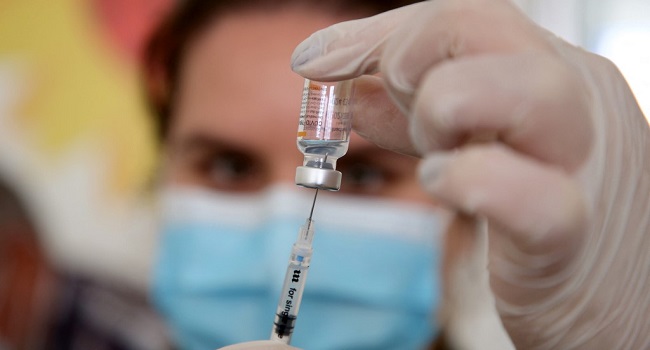
The United States authorized an extra dose of the COVID-19 vaccine for people with weakened immune systems overnight Thursday to Friday, as the country struggles to thwart the Delta variant.
Emergency use authorization for a third injection of Pfizer-BioNTech and Moderna vaccines was granted by the US Food and Drug Administration (FDA) regulator.
“The country has entered yet another wave of the Covid-19 pandemic, and the FDA is especially cognizant that immunocompromised people are particularly at risk for severe disease,” said acting FDA Commissioner Janet Woodcock in a statement.
The FDA said the additional dose was for solid organ transplant recipients or those with equivalent weakened immune systems.
US health authorities had been debating whether a third dose may be required, following a similar move by Israel.
Some media reports suggest that one million Americans may have had unauthorized third doses in an attempt to increase protection against the coronavirus.
“Individuals who are fully vaccinated are adequately protected and do not need an additional dose of Covid-19 vaccine at this time,” Woodcook said.
A Centers for Disease Control and Prevention advisory committee voted in favor of the decision on Friday, with the agency subsequently publishing its recommendations for the administration of a third dose for use by healthcare professionals.
However, the committee said people who received the Johnson & Johnson single-dose vaccine, a minority of the US population, were not included in the decision due to lack of available data.
– Booster moratorium call –
Earlier this month, the United States rejected an appeal from the World Health Organization for a moratorium on booster shots to help ease the drastic inequity in dose distribution between rich and poor nations.
More than 619,000 people have died in the United States from Covid-19, with case numbers increasing sharply in recent months due to the spread of the Delta variant.
The country’s rapid vaccination program hit resistance in politically conservative regions in the South and Midwest, among those with lower incomes and racial minorities.
But officials this week hailed recent progress, with a half million people getting newly vaccinated every day, and improved take-up among teenagers and in virus hotspots such as Louisiana, Alabama and Mississippi.
After the FDA ruling, Moderna CEO Stephane Bancel said it was “promising” that studies demonstrated a third dose could help immunocompromised people.
Covid-19 vaccines are free and widely available in the United States, though only half of the total population is fully vaccinated.
“Right now at this moment, other than the immune compromised, we’re not going to be giving boosters to people,” top US Covid-19 advisor Anthony Fauci told NBC on Thursday.
“But we will be following them very carefully, and if they do need it, we’ll be ready to give it to them… inevitably there will be a time when we will have to give boosts.”
Scientists on the CDC committee will meet again at the end of August to review data on the potential of recommending a third dose for other population groups, including adults over 65 years of age, long-term nursing home residents and health care professionals.
These populations were among the first to receive a vaccine in the United States and health authorities want to study whether their level of protection against Covid-19 has eroded over time.
Any such decision, however, would “need to focus on the prevention of severe disease, hospitalization and death,” said Sara Oliver, a physician with the CDC.
President Joe Biden announced in July that all federal employees must attest to being vaccinated or face tough restrictions, such as regular testing, amid a surge in hospitalizations.
Propelled by the highly contagious Delta variant, coronavirus infections have soared to a daily average of more than 100,000, a level not seen since the winter surge.

